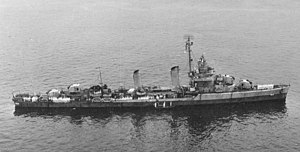USS Lansdowne (DD-486)

|
|
| History | |
|---|---|
|
|
|
| Name: | Lansdowne |
| Namesake: | Zachery Lansdowne |
| Builder: | Federal Shipbuilding and Drydock Company |
| Laid down: | 31 July 1941 |
| Launched: | 20 February 1942 |
| Commissioned: | 29 April 1942 |
| Decommissioned: | 2 May 1946 |
| Fate: | Transferred to Turkey, 10 June 1949 |
| Struck: | 15 August 1949 |
| Motto: | "We are going through together" |
| Honours and awards: |
12 Battle Stars |
|
|
|
| Name: | Gaziantep |
| Acquired: | 10 June 1949 |
| Struck: | 1973 |
| Fate: | Scrapped in 1973 |
| General characteristics | |
| Class and type: | Gleaves-class destroyer |
| Displacement: | 1,630 tons (2,200 tons loaded) |
| Length: | 348 ft 4 in (106.17 m) |
| Beam: | 36 ft (11 m) |
| Draft: | 17 ft 5 in (5.31 m) |
| Propulsion: |
|
| Speed: | 37.4 knots (69 km/h) |
| Range: | 6,000 nmi (11,000 km; 6,900 mi) at 14 kn (26 km/h; 16 mph) |
| Complement: | 16 officers, 260 enlisted |
| Armament: |
|
USS Lansdowne (DD-486), a Gleaves-class destroyer, is the only ship of the United States Navy to be named for Lieutenant Commander Zachary Lansdowne. He was awarded the Navy Cross "for distinguished service ... as one of the crew of the British airship R34, which in July 1919, made the first successful nonstop passage from England to the United States."
Lansdowne was laid down on 31 July 1941 by Federal Shipbuilding & Dry Dock Company of Kearny, New Jersey and launched on 20 February 1942, sponsored by Miss Peggy Lansdowne, daughter of Lt.Cmdr. Lansdowne. The ship was commissioned on 29 April 1942, Lt. Cmdr. W. R. Smedberg III in command.
Lansdowne first operated along the Atlantic seaboard on shakedown, antisubmarine, and escort duty, and attacked an enemy submarine off Cape Hatteras on 3 July. Following a severe depth charge attack, large quantities of oil bubbled to the surface and it was presumed the submarine had been sunk. Arriving at Cristobal, Panama Canal Zone, 13 July, the destroyer was sent to a position where PC-458 had located an enemy submarine. Upon arrival, Lansdowne launched a depth charge attack. Large quantities of oil rose to the surface, and the forward motion of the submarine ceased. Postwar records established that U-153 was sunk by these attacks.
...
Wikipedia
